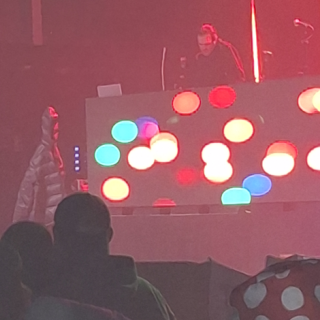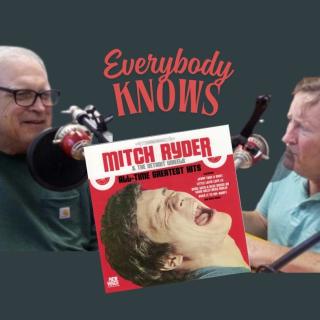Advertisement
While recording his new album, Superorganism, Mickey Hart donned an EEG cap and a computer channeled the electrical impulses of his brain waves into sounds. From there, according to his silly liner notes, he incorporated them with his music. "These sounds are noise--harsh and strange--and it is only after dancing with their essence face to face that music can be created."
But that doesn't answer the question Superorganism's cover picture of his brain provokes: Isn't Mickey Hart's brain scan a lovely replica of a jellyfish? From the Dead's ubiquitous skull logo to Mickey's mental matter--this is progress?
The squishy weird thing that floats by you in our dirty, filthy, medical-waste-strewn oceans isn't what came to mind last week when Hart and his band played under the big tent in the Woodlands Tavern's back parking lot. No, first of all, the lovely, frightening post-Grateful Dead crowd of forever young and yet old-before-their-time pre-humans make one think it was a collection point for a Noah's Ark of unwanted pets. Funny-lookin' folk, really. Misshapen, swaying, graying seaweed creatures that they were, part sea-horse, part Twilight Zone unicorns, it's always a sociological freak treat to be amongst Jerry kids.
The music, competently played by half-a-dozen competents, was unremarkable, but then again Hart is an unremarkable percussionist simply bashing away at his complicated pile of electronic drum pads and organic ring-a-dings which he hit perpetually on the beat with embarrassingly little polyrhythmic sense. Some, but not much. He'd never cut it in San Juan sitting in with Puerto Rico's hotel salsa bands.
The part about the brain waves, I don't know. There was a constant rumbling, bassy trance-like element to his mostly R'n'B-inflected Americana and at the end of the night he did introduce a fellow who'd been standing by a lone keyboard three feet from him as so-and-so who did "sound design." I thought it added a lot to his otherwise humdrum music and cosmic raps about hugging cops and doing something with the night's energy the next day, like, you know, we wouldn't've without his condescending bullshit.
Strangely enough, though, to be honest, even though I've seen pregnant Girl Scouts be more adventurous musically, there WAS such a spirit of fun in the air. And it wasn't forced, like everything else about hippiedom's hedonist toxicity. It was just really damn nice to hear a spirited band play some decent material very well with a good-hearted sorcerer at the controls (no small thanks to the spiritual/gospel-like singing of Crystal Monee Hall).
Hey, to quote Nick Lowe (words made famous by Elvis Costello), what's so funny about peace, love and understanding? For once I got it. Jellyfish are go.
_______________________________________________________________________
It's a strange thing to read specific news stories about the Afghan war and realize death and destruction happened exactly where I was five years ago. I was embedded with the 23rd Marine Expeditionary Unit, a combat brigade of some 2,000, most of whom were Iraq veterans of the bloody fights for Faluja, the infamous city which changed hands several times.
I bring this up because this week the Marines fired two of their top generals in Afghanistan because of the successful Taliban raid at Camp Bastion in the notorious Helmand Province, a combat airbase I spent a fair amount of time going to and from. The Taliban hit the camp one night last year somehow breaching the giant barrier walls, destroying a number of Marine aircraft and killing or wounding 10 Marines. The generals were fired by the brass for unpreparedness, an unforgivable sin in war.
I can remember the first morning I was there, waking up early to go to the Marine latrine to tend to my glorious case of dysentery. What better way to see Afghanistan than to tour its outhouses of imperialism? After my morning bout of gastrointestinal torture, I walked a ways to a small, squat guard tower only slightly higher than the walls. One climbed up rows of .30-caliber ammunition cans to get in.
After asking permission to enter, which was granted by the lone Marine sentry, my eyes took a few seconds to adapt to the half-light. When I could finally see I was stunned: the Marine was in a crouching firing position leaning on the guardhouse's sandbags, his eye trained through his rifle scope at a turbaned Afghan 75 yards away who was inching his tractor and a small two-wheeled trailer closer and closer to the fort's walls. Definitely a probe.
A light machine-gun was facing out behind the Marine who was moving only his lips as he spoke with Marine base headquarters, quietly whispering into his small shoulder radio, waiting for the command to shoot. Three hand grenades were in a neat row within 18 inches of his left hand. More ammunition cans were piled in the corner. His right-hand trigger finger ready to pull.
For head-pounding minutes I stood frozen. Even I knew this “farmer” was no innocent. He slowly kept approaching within a few dozen yards of the walls, pausing, then creeping forward. God knows what was in his wheel-barrow-sized trailer. Four artillery shells, perhaps?
The command to shoot didn't come. After 15 minutes the wayward farmer had moved into the British sector of the camp's outer territory, so responsibility was passed. I'd almost seen a man killed. He wasn't innocent. The Marine relaxed and simply shrugged. Another day in Afghanistan. And it wasn't even 6 a.m.
The red desert of many shades stretched out endlessly, from the foot of the fort and uncountable miles beyond to the western horizon. Half-light comes very early in Afghanistan, making the desert change colors every few minutes. Thus twice a day, at dawn and at dusk's leaving light, the Afghanistan desert is beautiful. But it is deadly all day long.
CUTLINE: (Petric Mickey Hart)
Mickey Hart (of Grateful Dead fame) entertained the crowd at Woodlands Tavern last week by “bashing away at his complicated pile of electronic drum pads and organic ring-a-dings,” according to John Petric
photo by John Petric



